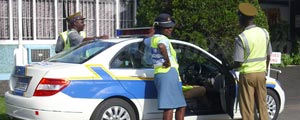
Motorists must have received with relief High Court judge Justice Francis Bere’s authoritative law-based remarks that police had no legal right to demand spot fines and impound cars at roadblocks or detain motorists for various perceived offences.
NewsDay Editorial
Castigating the police for deviating from their core business of enforcing the Highway Code, Justice Bere said there was no law which compelled any motorist to deposit a fine with the police if the motorist desired to challenge the alleged offence.
He said any collection made by the police must be made in terms of Section 356 of the Criminal Procedure and Evidence Act (Chapter 9:7) which does not give the police the power to force motorists to pay a fine on the spot if they did not wish to do so or if they do not have the money on their person.
Police in the past few years had become a menace on the roads. They had turned the country’s road network into a money spinning venture.
It was believed at the height of the economic crisis they had been authorised to use roadblocks as the force’s main revenue stream. Ever since they were given the permission to keep all their collections, unlike in the past when such collections were remitted to Treasury, the police had gone into overkill. They set up roadblocks literally everywhere much to the inconvenience of the travelling public.
In many cases motorists were asked to pay spot fines for the most innocuous reasons. Travellers began to refer to these roadblocks as tollgates, because they served no other purpose that to extort money from the public.
The practice didn’t affect only local motorists, tourists too were not spared. During the festive season it became common for tourists to protest through the media the amount of extortion and inconvenience they had to endure.
- Chamisa under fire over US$120K donation
- Mavhunga puts DeMbare into Chibuku quarterfinals
- Pension funds bet on Cabora Bassa oilfields
- Councils defy govt fire tender directive
Keep Reading
The practice bred corruption as policemen and policewomen demanded bribes. This was easy for them to do since they didn’t have to account to any court of law. Much of the money collected ended in individuals’ pockets. This was evidenced by the fact police details began to exhibit signs of riches. They began to own vehicles which the public knew they could never afford from their meagre salaries. Commuter omnibuses were the worst hit since they had to pay some kind of extra-judicial tax to the ZRP.
Most omnibus operators were driven out of business and replaced by police officers who began to own fleets which were immune to these “taxes”.
Interestingly, the highway police’s core business of enforcing order on the roads suffered as motorists with defective vehicles got away with it by simply paying bribes. Ironically, the more the number of roadblocks, the more the number of accidents recorded on the roads. The road network became a jungle where only the most daring drivers thrived. Zimbabwe must have the highest rate of road accidents in the region.
Justice Bere’s valid sentiments should bring some sanity on the roads as the police will be beholden upon to apply the law by its letter and spirit and the enforcement of the law will begin to impact positively on motorists who would no longer survive on paying bribes.
The nation will, however, wait with bated breath to see whether Justice Bere’s judgment will be enforced when the police themselves are the culprits.











